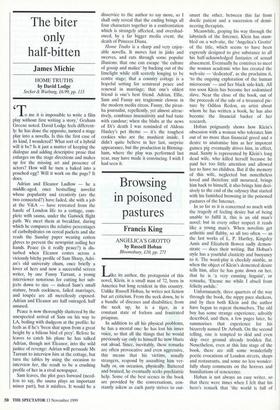The biter only half-bitten
James Michie
HOME TRUTHS by David Lodge Seeker & Warburg, £6.99, pp. 115 me it is impossible to write a film play without first writing a story,' Graham Greene noted. David Lodge feels different- ly: he has done the opposite, turned a stage play into a novella. Is this the first case of its kind, I wondered? What sort of a hybrid will it be? Is it just a matter of keeping the dialogue and adding descriptive prose that enlarges on the stage directions and makes up for the missing art and presence of actors? How will he turn a baked into a poached egg? Will it work on the page? It does.
Adrian and Eleanor Ludlow — he a middle-aged, once bestselling novelist whose popularity and creativity (are the two connected?) have faded, she with a job at the V&A — have retreated from the hassle of London life to a cottage, com- plete with sauna, under the Gatwick flight path. We meet them at breakfast, during which he compares the relative percentages of carbohydrates on cereal packets and she reads the Sunday paper wearing cotton gloves to prevent the newsprint soiling her hands. Peace (is it really peace?) is dis- turbed when Eleanor comes across a viciously bitchy profile of Sam Sharp, Adri- an's old university chum, once briefly a lover of hers and now a successful screen writer, by one Fanny Tarrant, a young interviewer notorious for cutting her sub- jects down to size — indeed Sam's small stature, brash cockiness, failed marriages, and toupee are all mercilessly exposed. Adrian and Eleanor are half outraged, half amused.
Peace is now thoroughly shattered by the unexpected arrival of Sam on his way to LA, boiling with dudgeon at the profile: he feels as if he's 'been shat upon from a great height by a bilious bird of prey'. Before he leaves to catch his plane he has talked Adrian, though not Eleanor, into the wild justice of revenge: Adrian will persuade Ms Tarrant to interview him at the cottage, but turn the tables by using the occasion to interview her, the result to be a crushing profile of her in a rival newspaper.
Sam leaves, the plot goes forward (need- less to say, the sauna plays an important minor part), but it misfires. It would be a disservice to the author to say more, so I shall only reveal that the ending brings all four characters together in a confrontation which is strangely affected, and overshad- owed, by a far bigger media event, the death of Princess Diana.
Home Truths is a sharp and very enjoy- able novella. It moves fast in jinks and swerves, and cuts through some popular illusions: that one can escape 'the culture of gossip and malice' by backing out of the limelight while still secretly longing to be centre stage; that a country cottage is a hopeful setting for semirural peace and renewal in marriage; that one's oldest friend is one's best friend. Adrian, Ellie, Sam and Fanny are tragicomic clowns in the modern media circus. Fanny, the piran- ha journalist, repellently, yet almost attrac- tively, combines insensitivity and bad taste with candour; when she blubs at the news of Di's death I was reminded of Aldous Huxley's pet theme — it's the toughest cookies who are the mushiest inside. I didn't quite believe in her last, surprise appearance, but the production in Birming- ham, where the play was performed last year, may have made it convincing. I wish I had seen it.


























































































 Previous page
Previous page